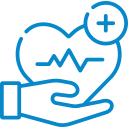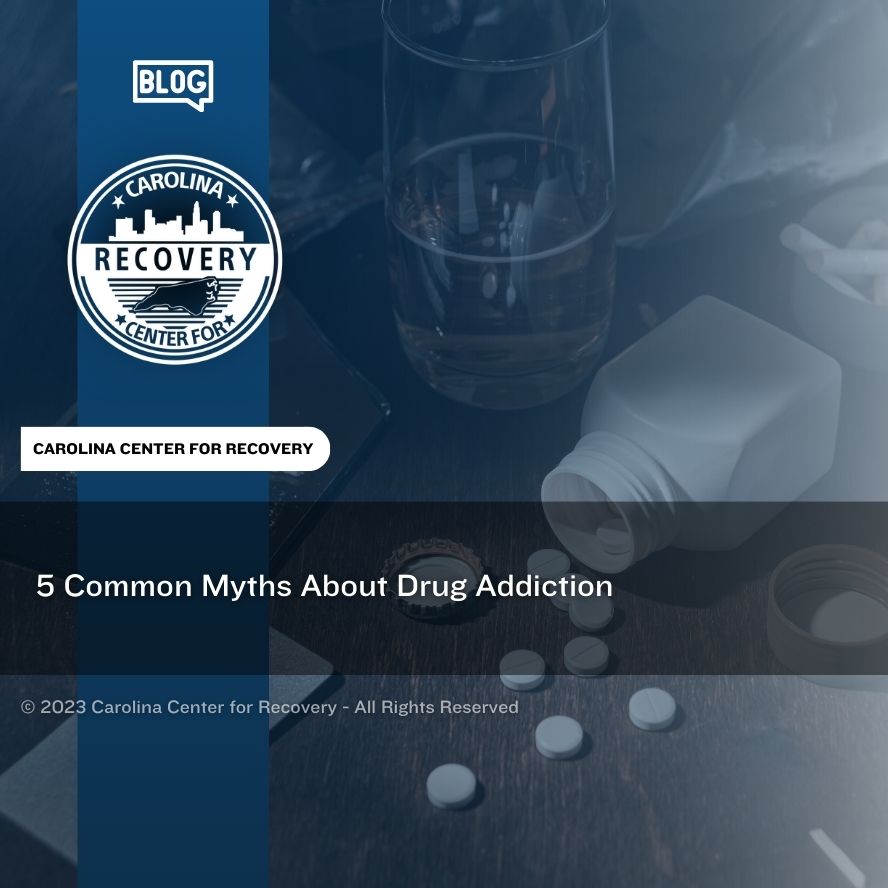Millions of people in the United States struggle with substance use disorders (SUD). Addiction is a serious and complex condition that impacts every aspect of a person’s life. Living with an untreated addiction to illicit or prescription drugs can cause long-term harm. It can damage a person’s physical health, emotional well-being, relationships, and more.
Despite all the damage substance abuse can cause, most people with SUD don’t get the help they need. There are many reasons a person may delay getting help. Some common myths about addiction may prevent people from seeking life-saving treatment.
In this article, we will explore some of the myths people believe about addiction.
What you will learn:
- Common myths about addiction
- Why myths can be harmful to people struggling with addiction
- Where to seek treatment and support in recovery
Contact the Carolina Center for Recovery specialists now to learn about addiction or to find treatment. Our comprehensive, supportive treatment programs can give you a fresh start. Start your recovery journey by reaching out to our intake team today.
5 Myths About Drug Addiction
There is often a stigma around the issue of addiction. People may have false beliefs or distorted ideas about how and why addiction occurs. These myths may keep people locked into a destructive cycle of substance use and dependence.
Here are five common myths about drug addiction.
Myth 1: You must hit rock bottom before getting help.
Many people believe that people with addiction must reach their lowest point–known as “hitting rock bottom”–before seeking treatment. Hitting rock bottom can mean different things for each person. However, it typically involves a severe consequence, such as:
- Losing custody of children
- Being fired from a job
- Hurting yourself or another person
- Legal problems
- A significant medical diagnosis
- The breakup of a relationship
Movies and TV shows depict characters hitting rock bottom to show the severity of an addiction. But in real life, people may face life-altering consequences that impact the rest of their lives, as well as those of the people they love.
Reality check: The belief that people need to “hit rock bottom” is dangerous. It can prevent people from getting help as soon as they notice signs of substance abuse or addiction.
In most cases, people have better outcomes when they seek treatment before an addiction has taken over their lives. Recognizing early signs of addiction can help people seek treatment before facing the severe consequences of their substance use.
Myth 2: Addiction is a choice
One of the most damaging myths about addiction is that it is a choice. People living with substance abuse and dependence may attempt to stop using drugs on their own, believing that they simply need to be stronger or more disciplined.
Many people believe that people with addiction simply need more willpower or that they have a character flaw. This can prevent people from seeking help to quit using drugs.
Reality check: Addiction is the total loss of control over substance use. People with addiction do not choose to use drugs. They must use them to prevent severe withdrawal symptoms and to function. While people may choose to experiment with addictive substances, addiction itself is not a choice.
Myth 3: Addiction is always noticeable
One pervasive myth about addiction is that it always prevents people from functioning. People may imagine that people with addiction can’t keep a job or attend school or that they always show noticeable physical signs.
Reality check: It is not always apparent that someone is living with addiction. Just because a person can work or function does not mean that their addiction isn’t dangerous. Addiction often harms a person’s mental and physical health before the damage becomes obvious to others.
Myth 4: Addicted people cannot work
A common myth about addiction is that it always prevents people from working. People may imagine that if a person has a job, it would be impossible for them to struggle with addiction. This myth can keep people from recognizing an addiction.
Reality check: Most people living with substance abuse and addiction are employed. People may continue to go to work while addiction wreaks havoc on their lives.
Myth 5: A relapse is a failure.
Many people believe that relapsing is a sign that recovery is impossible. They may see a relapse as a failure. This belief can prevent people from exploring why the relapse occurred, learning from it, and moving forward.
Reality check: Most people in addiction recovery experience at least one relapse. A relapse is not a failure. It is often a sign that someone needs more support, treatment, or resources to stay sober.
Find Addiction Treatment
If you or a loved one is struggling with substance abuse or addiction, you are not alone. Effective, comprehensive treatment is available at the Carolina Center for Recovery.
Don’t believe the myths about addiction. Contact us today to discover the evidence-based care you need to work toward lifelong sobriety.










